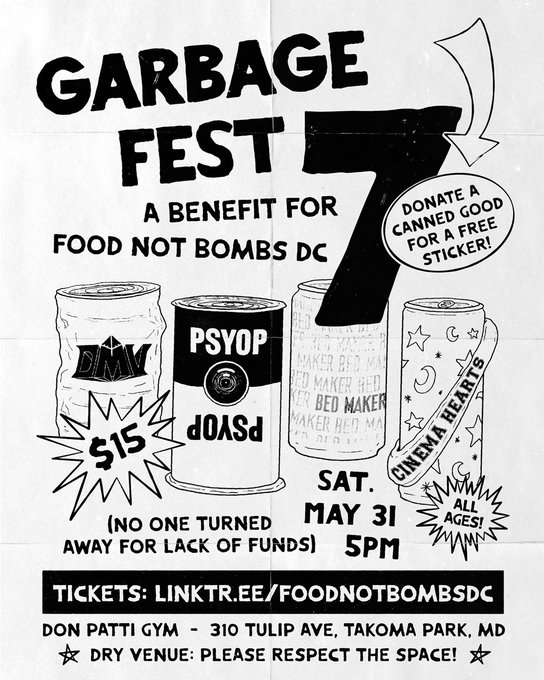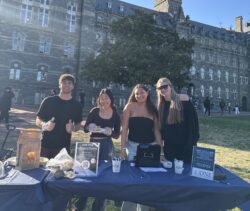“If ‘the man’ isn’t going to help our neighbors, we can step up and, together, help each other,” Caroline Weinroth, lead singer of Washington, D.C.-based band Cinema Hearts, said. On May 31, Weinroth and her bandmates will take the stage at Garbagefest, a benefit concert where her statement couldn’t ring truer.
Now in its seventh iteration, Garbagefest is hosted by Food Not Bombs DC, the Washington chapter of a volunteer-run collective that rescues surplus food and distributes vegan and vegetarian meals to anyone who needs one—no questions asked.
Garbagefest helps fund that mission and celebrates the volunteers who make it happen. While this year’s show will be held in the Don Patti Memorial Gym at Takoma Park Presbyterian Church, the event has much humbler roots.
“The first ones were like a house party with bands playing in someone’s home. And then we kind of grew into more formal music venues or larger spaces. It’s still very DIY [do-it-yourself],” Hannah Flood, a Food Not Bombs volunteer and the primary organizer of Garbagefest, said.
The “do-it-yourself” mentality shapes every part of the event, which intentionally has no corporate sponsorships, relying solely on donations and ticket sales. According to Flood, that financial independence allows for flexibility that wouldn’t otherwise be possible.
“Keeping things very rooted in the abilities, intentions and effort of the community is super important to keeping the community in control of things,” she said. “If we were operating through one of these larger event corporations, we wouldn’t be able to make a choice like saying that anyone who needs a discounted ticket, or free ticket, can just come on in.”
This year’s lineup features four local bands—Cinema Hearts, Psyop, Bed Maker, and D.M.V.—all playing for free. Flood describes the lineup’s wide range of music genres, such as Bed Maker’s slower, post-punk sounds and D.M.V.’s roots in hardcore punk—a genre long embedded in Washington’s music history—but notes that a shared commitment to mutual aid unites them.
For members of Psyop, fighting food insecurity is personal.
“All of our members have battled poverty at one time or another,” Daniel K. of Psyop wrote in an email to the Voice. “If it wasn’t for mutual aid our lives would be a lot harder.”
Psyop is a hardcore punk band that began in 2018 as an informal recording project based in a member’s basement. Since the pandemic, they’ve expanded to a full live act. Though their sound has become more refined in this time, they remain rooted in the spirit of the punk underground.
“DIY events and benefits are crucial for the local music scene not just to build awareness and directly fundraise, but to expose audiences to new viewpoints and provide a platform for upcoming bands,” Daniel wrote. “D.C. has an impressive history of using music as an avenue for social justice.”
While not a punk band by genre, Cinema Hearts fits right in with this mantra. Weinroth describes her music as inspired by “’60s girl groups,” “garage rock” and “’80s power pop,” but her values align with punk’s core ethos.
“I don’t really make punk music, but I feel like I have punk ethics,” she said.
To Weinroth, punk ethics consist of “having all-ages shows, having safer spaces, participating in mutual aid, having benefit shows, including marginalized voices [and] putting trans bands, bands of color [and] women to the front.”
Before becoming the frontwoman of Cinema Hearts, Weinroth competed in Miss America pageants, where her platform focused on enacting social change through music. Today, that pursuit hasn’t wavered—she’s just taken it to a different stage.
To both Weinroth and Daniel, grassroots efforts like Food Not Bombs are so important because the systems that are put in place to care for people often fail to do so.
“Our government, our politicians and our media have all failed us,” Daniel wrote. “Our local government here in D.C. is beholden to corporate developer interests and bows down to the federal fascist government. They have no interest in providing for their community and actively criminalize and antagonize unhoused and vulnerable folks, so we have to make an effort ourselves.”
Flood expressed similar frustrations, particularly as changes in Washington have affected Food Not Bombs and the vulnerable populations that benefit from their work.
“The increased privatization of public space makes the lives of a lot of the people we serve much more difficult,” she said. “We have general concerns about the function of these public spaces being warped to meet private interests more so than the needs of the actual people in the community.”
However, despite their disillusionment with many of the larger systems meant to aid communities, both Flood and Daniel remain hopeful about Garbagefest’s impact.
“The venue can hold about 500 people, and the last six benefit shows I’ve been involved with have sold out. So, we’re expecting a big turnout,” Flood said.
For Daniel, that turnout means more than just numbers.
“Punk music won’t change the world or politics at large,” he wrote, “but ideally it brings people together.”







